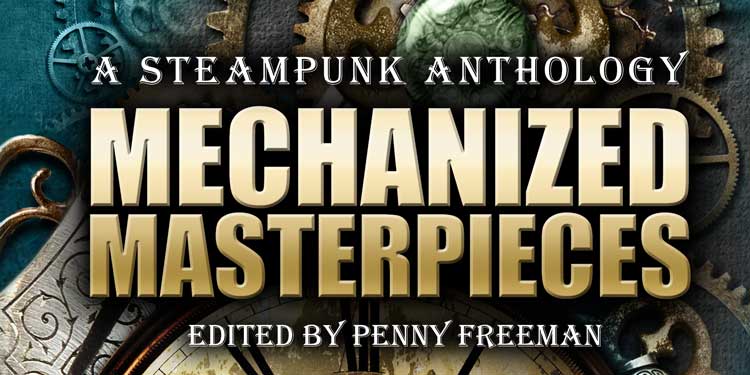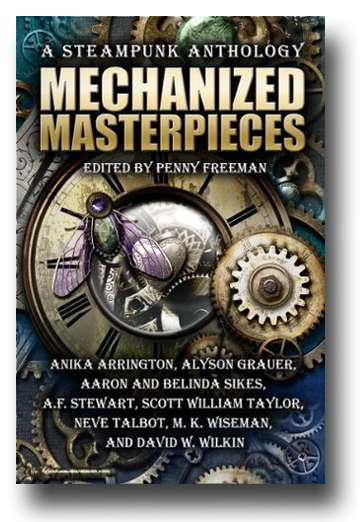The fact that I had never before heard the term “Steampunk” before I came to work at Xchyler Publishing proved no deterrent. Attempts to define the genre are ambiguous and fleeting, but as soon as one realizes someone has put a name to it, they understand that Steampunk has permeated popular culture. “Wild, Wild West” (the original) is the first that comes to mind. It was one of my favorites growing up. The list goes on and on, but suffice it to say, writing to suit that audience gave me no pause.
However, I did want to capture the right aesthetic while still remaining true to my own style. That was the tricky part. I take objection to the over-sexualization of women in any genre or medium, but Steampunk seems rife with it. Also, a lot of Steampunk delves heavily into the realm of the supernatural, often growing very dark and satanic, which neither do I write. On the surface, when one considers Charlotte Bronte’s heroine, the sheltered and faith-filled Jane Eyre, the two elements seem a dichotomy that can never logically cohabitate. However, Bertha Mason provides that bridge. She is made to order, and getting her right without growing overly offensive proved a challenge.
I found it interesting that as lightly as I painted her, some reviewers felt my portrayal of Bertha’s actions gratuitous, and Edward Rochester uncharacteristically harsh. However, in Miss Eyre’s work, the husband describes his wife thus:
“Jane, I will not trouble you with abominable details: some strong words shall express what I have to say. I lived with that woman upstairs four years, and before that time she had tried me indeed: her character ripened and developed with frightful rapidity; her vices sprang up fast and rank: they were so strong, only cruelty could check them, and I would not use cruelty. What a pigmy intellect she had, and what giant propensities! How fearful were the curses those propensities entailed on me! Bertha Mason, the true daughter of an infamous mother, dragged me through all the hideous and degrading agonies which must attend a man bound to a wife at once intemperate and unchaste.”
Do overs: So, three years and one very critical review later, would I write Bertha the same way again? I don’t know. I have come to realize more fully (thank you, Fifty Shades of Grey) that what more sheltered people view as mere fashion statements others interpret as visual cues of a lifestyle choice that is probably beyond the writer’s intent. So, I probably would have dressed her a tad more conservatively, at the very least. I most definitely would have omitted the attempts at phonetic dialogue. That was a huge mistake, and I apologize for it in advance. But . . . there it is. You write and you learn and you write some more, hopefully with some improvement.
The most difficult thing about writing “Tropic of Cancer” was shortening it to anything resembling a short story, although, in truth, some may call it a novella. Like too many of my secondary characters, Julian took on a life of his own, and there is much more of Edward’s story to tell. It will become a full-fledged novel one day, but right now, it has to wait in the queue.
an excerpt from Mechanized Masterpieces
“Tropic of Cancer”
by Neve Talbot
My father went to his grave without a word of praise for me falling from his lips. He never truly knew me. Even so, he knew human nature, and therein lay his genius and my downfall.
My father knew the profundity of the fable “Sun and Wind.”
Sun and Wind argued over who wielded more power. They determined to settle the argument with a competition. They spied a traveler walking down the road, wrapped in a cloak. The contest: wrest the man’s protection from him.
Wind accepted Sun’s invitation for the first go. It blew and loosened the man’s wrap. Then, Wind blew harder, forcing the man to struggle to keep his mantle. However, the stronger Wind blew, the fiercer the traveler held to his cloak. At long last, Wind prevailed by blowing his victim from his feet.
Despite Wind’s self-satisfaction, Sun took its turn with confidence. It shone upon the wayfarer. The air warmed. The man loosened his grip upon the cloak as he walked. Then, he removed it and slung it over his shoulder.
Thus, my father wrested my dreams from me.
A passionate youth, a lover of all things mechanical, I fancied myself a changer of the world—an inventor—and so earned my father’s patrician contempt. I nursed great ambitions but assumed no generosity on his part. I knew the entire Rochester fortune portioned to my elder brother, Rowland.
I desired only two things from my father: the freedom to make my own way in the world without interference from my family, and his ward and niece, Yvette Fairfax, as my bride. My father bequeathed me neither.
My attempts to keep the latter concealed from him failed. My father’s actions professed him perfectly sensible of the attachment between Yvette and me. However, he never mentioned it.
Instead, the man sent me into the sun.
![]()
As my father’s agent, I traveled from London to Spanish Town, Jamaica, in the prototype airship of my own design. My father assured me linking my fortunes with Jonas Mason, a wealthy cane planter, would set me for life. My friend and partner, Professor Heinrich Rottstieger, accompanied me. Afforded little choice, we resolved to make my father’s dictates serve our own ends.
All manner of airships abounded at that time, but with Herr Professor’s metallurgic discoveries, and my own invention, a sunlight-dynamo power source, our design would revolutionize air travel. In Jamaica, I would conduct further investigations into the energy-retentive powers of crystals.
My sweet Yvette provided the impetus for every scheme. My hopes in her propelled me forward. And, lest my recollections of her fade, the engraved crystal that hung about my neck continuously brushed my skin and thrust her to the forefront of my thoughts.
Not yet one and twenty, I had never before traveled beyond the shores of Great Britain. The trappings of “progress” and “civilization” defined my world: coal, steam, copper, and steel. Creation seemed made up of these things.
However, in every port of call—Lisbon, the Azores, Bermuda—the greater the distance from my homeland, the more alien and strange the world became to my limited experience . . . the stronger Nature clung to that which is rightfully her own: clear skies, blue sea, unpolluted shores. The breath of life.
We had nothing but ease on our journey: fair winds and a furrowing sea, so to speak. In clear skies over deep waters, with the silver of our triple envelopes gleaming in the sun, our image shone back at us. Our configuration, long and sleek—the fins and rudders, the stern propellers and engine houses—created what appeared a strange creature of the deep running beneath us.
We cleared the emerald-green mountains northeast of Kingston on the morning of the fifteenth day. The absence of man-shaped mechanoids patrolling the streets grabbed my attention. Where were those brutal implements of totalitarianism? Those clockwork weapons with head, arms and legs, but no conscience or compassion?
I realized nothing of mechanization had invaded that island—no airships, no dreadnaughts, no rail guns or steam engines. No sub-aquatics patrolling the deep in an illusion of absolute control. No steam-sweepers or horseless carriages chugging and puffing, filling the air with their noise and soot. The light shone pure and clear, the sky as azure as the sea.
Heinrich circled low over Spanish Town. Children raced the Andromeda to her landing site. At the broad expanse of lawn before the Mason mansion, they hesitated. When the airship belched our engineers from the hold, and they rappelled down the lines to anchor us to terra firma, the children cheered. The adults who trailed after them seemed only slightly less eager.
Not the least trace of soot smeared the pure faces before me. Likewise, the weary existence and unending toil of the downtrodden in London seemed absent in Jamaica. In this sea of humanity, their black skin a grace of Nature, rather than the curse of industrialization, I could yet see hope.
Did I see poverty? In abundance. The need for reform? Without doubt. But unlike Mother England, I saw happiness in the faces of the poor. I saw dignity; belief in themselves. I felt myself the serpent in the Garden of Eden with my hold full of cargo and my brain full of technological marvels. I wondered what mischief I had wrought in this island paradise simply by bursting onto the consciousness of this people.
Thus, the inescapable paradox of my life lay bared before me: mechanization had long since become my great passion, but I detested its natural consequences. Young, sincere, and green as new spring, I swore Jamaica would not suffer the fate of England.
As I copiloted the airship in its final descent, a pair of women on the veranda of Mason’s home caught my eye. They stood on the balcony; an old crone leaned heavily upon a cane. Her weathered, ebony skin stood in sharp contrast to her hair of brilliant white. Her bright eyes shone sharp and quick. An aura of calm surrounded her.
She stood beside a young lady at the balustrade, a statuesque beauty whose complexion glowed like aged ivory. A gossamer robe provided token coverage of her nubile form. Her jet black hair hung in loose curtains down her back, and along with the folds of her dressing gown, ruffled in the morning breeze.
She appeared intent on the windscreen behind which I sat, which bubbled out from the cockpit of the airship. Eventually, the heckling of the old woman gained her attention. She then glanced at herself, tugged at her wrap, and turned into the house.
As we landed, Yvette’s crystal burned with an icy sting against my chest. I failed to understand the significance at that time, but with the chill, I relived the occasion when Yvette presented the gift, as I often did in future days.
![]()
We lingered, just we two, in the Andromeda cockpit. Yvette sat in the captain’s chair, fiddling with the knobs arrayed on the consoles before her. I knelt beside her, drinking in her lovely, grief-stricken face.
“I dread your departure, Edward,” she murmured softly. “I fear you will plunge into darkness and never escape. I cannot . . . It must not be so.”
“I told Father one year, Yvette. I go to make my fortune—our future. All of this is a means to an end—a bridge to my heart’s one desire. Tell me you—”
Her fingers on my lips silenced my tongue. Her looks forbade my speech. She held my gaze, her eyes swimming in tears.
She took my hand and held it. She turned the ring upon my finger. She had woven it of her own silken tresses. It shone like pure gold. “Promise me you will never remove this ring. No matter what else happens. Give me your sacred honor.”
I searched her features, unsettled by the desperation which laced her tone. “Never. I promise.”
“And yet, it is not enough,” she murmured. A look of firm resolve added complexity to the sadness and loss upon her face. Then, warm stone and cold metal settled into my hand. I raised into the air Yvette’s prize crystal hanging from a silver chain. The sunlight refracted through the stone and projected upon the bulkhead an image of the Andromeda herself, ablaze in rainbow colors.
“I had it done. A crystal from your workshop could serve, but this stone . . . you need it for protection.”
More than a mere line etching, a master craftsman had carved a relief of our airship onto the stone in minute detail. Deep in the recesses of my mind whispered the certainty that Yvette had employed forces I would never understand to accomplish what, I dared not speculate.
Yvette loosened my collar, clasped the chain about my neck, then tucked the crystal beneath my shirt. Her hand rested upon my bare chest as she whispered her instructions. “It must rest here, next to your heart, touching your skin.”
I riveted my eyes on her, willing her to meet my gaze. She busied herself in setting my attire to rights, yet would not look into my face. Her lips whispered some silent invocation I could not hear. Then, she gave her final instructions. “Use this to remember me. A token of my . . . friendship. To keep you afloat. To light your way home.”
I took up her hand and held it to my cheek. “I shall never remove it.”
Tears again welled in her eyes. “See that you don’t.”
“Edward! What the devil are you about?” Herr Rottstieger’s intrusion brought me to my feet, and one glance at the lady’s ducked head caused him to hesitate.
He harrumphed to clear his throat. “Well, then, mein junge. We must weigh anchor tout suite.”
Yvette rose and stepped to the hatch. I moved to follow her. “Just as soon as I see Miss Fairfax home.”
Yvette wheeled on me. “No, Edward. No. I have Rowland.”
“Yvette—”
“Please, Edward,” she breathed. “Let us part here as we are, the best of friends.”
My whole being revolted at the notion of such a cold parting. I would take her in my arms and bespeak my heart. I would profess my undying devotion, secure her to me. But I knew she meant to avoid such a scene. I could not discomfit her.
“The best of friends,” I repeated, forcing a smile. She extended to me her hand, but I leaned and kissed her cheek.
“Remember your promise,” she whispered, and then was gone.
![]()
At Spanish Town, Rochester coin opened the doors of the colony’s finest families. Naturally taciturn and unsocial, I found answering the demands of society a most onerous duty, but I got on by degrees. I dare say, I became good at it . . . at least, I gained confidence. I became, so it was said, the most popular young blade on the island.
Every now and again, Miss Bertha Mason—for such was the beauty on the balcony—would flit across the social stage, but remained otherwise elusive. I scarcely knew her.
Even so, she wormed her way into my consciousness. She battled with Yvette for my dreams. In them, the breeze which caressed the nymph’s soft skin with silken tresses, which flirted with her robe and offered teasing, tantalizing glimpses of a round of breast, a length of thigh, also wafted jasmine around me. It encircled and enfolded me until I awoke in a sweat, the scent still palpable in the air.
But then, the crystal would again cool my skin, and the fever which fought to control me receded at its touch. The clouds lifted, my mind cleared, and dreams of Yvette, fresh and clean and pure, would fill my mind. It felt a brisk early morning after a suffocating, sticky, and stultifying tropical night.
My father’s plans progressed apace. Within three months, I shared ownership with him and fully managed West End, a cane plantation at Negil, on the westernmost extent of the island. Within six, I had completed the initial phase of our planned rum distillery. Within nine, I had established myself as a member of the West Indies elite. Investors lined up to underwrite our airship manufactory. The sunlight dynamo in both distillery and sugar mill proved an unqualified success.
I wrote to my father and begged Yvette’s hand.
At the end of a year, I had done with waiting. My father’s silence on the subject and Yvette’s failure to write caused me no small amount of concern. I would attend Herr Professor on a three-month publicity tour of the East Coast of the United States, and from there, we would go to London. I would return with my bride.
![]()
Twenty hours and counting. I itched to be gone, but last-minute business at the governor’s mansion detained me. There, an acid etching illustrating a newspaper article on the notice board caught my attention.
I burst into the offices high in Hanger One and slapped the yellowed clipping onto the desk in front of Herr Rottstieger. “Look at it! Just look at it! Tacked up with the notices in the lobby like some tawdry bit of gossip!”
Lately, All Souls Church, Langham Place, London: Mister Rowland Fairfax Rochester, son of Rupert R. and the late Camilla Fairfax Rochester of Thornfield Hall, —shire, wed to heiress and society beacon, Miss Yvette Fairfax, daughter of the late Colonel and Mrs. Harrison Fairfax, last of Hyderabad, India. Couple to honeymoon on the Grande Tour before returning to their home on Wimpole Street.
My friend eyed me warily, without a single glance at the paper. I stepped back, undone by the truths I read so plainly on his face.
“You knew.” The words stuck in my throat. Herr Professor winced. His eyes fled mine. “By the devil! You knew and you hid it from me!”
He flinched as my palm hit the desk, a tiny jerk of the head as he stared at the floor. I pushed my hands through my hair with both fists to press back the whorl of disjointed thoughts that assaulted me. Tears rushed my eyes. A leaden weight sat on my chest. I could draw no air.
I stepped away from the violence bursting to free itself. My back to the man, I leaned against the windowsill, my outstretched arms pushing hard against it, as if somehow I could hold back the cataclysm. I stared blankly through the glass, wrestling with a gale of sensibilities, resolves, reckless, insane schemes to make her mine, struggling to cease my trembling and stifle a wail of despair-laden rage. A knock at the door at last shattered the silence. Herr Professor rebuffed it. Footsteps scurried down the wooden stairs.
“I didn’t hide it, junge.” He spoke softly, feeling his way. “You never read the papers.”
“You just neglected to tell me, is that it?” I turned to him. He no longer sat, but propped himself against a file cabinet situated against the wall. “How long ago was ‘lately.’ There is no date here.”
“Six months.”
I felt kicked in the chest by a mule. Herr Professor surely read my outrage. “I have not known for six months, Edward—only three months, perhaps. It has been six since the day.”
Realization of the truth settled over me like an arctic blast. “My father told you . . . That blasted bounder wrote and told you when, exactly.” Rottstieger again winced. “And all this time—all this time you have pretended to be my friend—pretended to encourage me, to share my joy! You played me for a fool!”
“No, Edward. When you wrote and asked Yvette to be your wife, I knew nothing of the matter. The letter from your father came after you told me what you had done.”
“And so for three months, every time you delayed our departure—all of it was a lie to put me off!”
“I delayed because Rochester told me he would write—they would write. They would tell you themselves in their own time. In their own way. I kept waiting for that letter, Edward—for Rowland to do the honorable thing. I had resolved to tell you . . .”
“When? When, exactly, were you planning to extend me that courtesy?”
“Before we got to England.”
“But after we left Boston,” I spat. “It would not do to spoil your precious tour.”
Herr Professor closed his eyes in capitulation. “No. It would not.” His pulse throbbed at his throat and he swallowed hard. “I never wanted this to happen, Edward. I never expected it to end like this.”
I peered at him. “What are you not telling me?” He heaved a sigh and I felt the last piece of the puzzle drop into place. “You have been in on it all along,” I whispered. “You took his part.”
“No, Edward. I never took his part. Anything I did, I did for you.”
“For you, you mean to say!”
“No, junge. For you.”
“How much? How much did he pay you to get me away from Yvette so Rowland could marry her? How much to properly merge the Fairfax and Rochester fortunes?” He hesitated, tongue-tied, and I slammed my fist on desk. “How much, Heinrich?!”
“The matching funds. If I could get you to Jamaica, he would match whatever other investors gave you—gave the corporation.”
“The matching funds? His club dues are more than his precious matching funds! You should have asked me, Heinrich. I could have got you better.”
“You have no idea what it meant to have Rupert Rochester invest in us. He is respected, known for his perspicacity. His endorsement gave us gravitas. That he would not invest in his own son’s inventions—it damaged our cause more than you can imagine. But what harm could a trip to Jamaica do, eh? How much good would come of it . . . at least, so it seemed to me.”
I snorted, then flopped to a chair and dropped my head into my hands. A storm raged within. I gripped my hair fiercely, clinging to something—anything—to keep from going under.
My friend sat beside me and placed his hand upon my shoulder. “Mein sohn,” he ventured after a long moment, “no one could see you together and not know she loved you. That day—the day we left—when you were together in the cockpit, with the door locked and Rowland so frantic to get inside . . . I thought you had secured her promise. By my life, I thought you were secretly engaged.”
The pall of his words settled over me and I looked up. I could not deny the overwhelming sadness in his eyes, a mere glimmer of the grief my new clarity gave me. “No, Professor . . . No. She would not hear me. She sent me away.”
My anger vented, the resentment seeped from me. In the fog of my self-deception, I believed with all my heart she would wait, but the cold, stark truth revealed my folly, and I could not begrudge Herr Rottstieger his own.
I leaned back in my chair and pushed the hair from my face. I heaved a sigh. “What now?”
“What do you want to do?”
“Besides hurl myself from the highest cliff?”
“Junge . . .”
“What is there for me now, professor? Everything—everything I have done has been for her, for our future together. What good are my dreams without her to share them?”
“Edward, without you, I would be nothing but another iron monger, an engineer forging the inventions of other men without enough mettle to build my own. But with you—I became bigger than myself. Like all the men you employ, who now earn a fair wage and can send their children to school instead of into the fields, I flourish because of your dreams. If not for yourself, junge, soldier on for these people. They dare to dream because you live yours.”
I could not say how deeply his words sunk into my heart then, but they have since become my mantra—more or less. Then, as now, I felt the caveat: I lived the dream I managed to scrape together from the rubble of my castles in the air. But that had to be enough. I had to prove to them all—to my father, the blasted blighter, to Rowland, to Yvette herself—that they had not inflicted the mortal wound to my soul that then bled bitter tears—and bleeds still.
I rose to my feet and moved to collect the scrap of paper, but my hand hesitated over the desk, distracted as I was by an envelope edged in black sitting on the blotter. I glanced at Herr Professor. “Heinrich? Have you lost someone?”
His brow furrowed with concern. “Nein, junge. That came for you this morning.”
He must have moved a chair behind me, as I did not hit the floor when my knees buckled. The letter rattled in my hand. The black border hissed, rearing and ready to strike. I forced myself to rip open the envelope and read my brother’s smooth hand.
I snorted. “The old buzzard popped off.” A bitter, ironic laugh surged through me. “He gives me precisely one hour to curse him to the devil, and then denies me the pleasure of hating him for the rest of his days.”
“The man was the picture of health!”
“Apparently, a rogue mechanoid didn’t like the cut of Old Man Rochester’s jib. He stepped from his carriage and . . . Do you recall, Professor, my outrage over their use as peacekeepers? He derided me for a stupid boy who could not understand such things. What do I know, eh?” I snorted my disgust.
“And Yvette? She is well?”
The name leeched a bit of acid from my soul and my manner softened. “Yvette is in indifferent health. They have taken a house in Athens for a time until . . . until she is safely delivered. Rowland will not leave her, thus requests that I see the solicitors myself.”
Herr Rottstieger peered at me. “And you, Edward? You have just lost your father.”
I flapped the papers at my friend. “And gained full ownership of the plantation and all of my father’s interest in the corporation.”
“There. Do you see? He always intended—”
“No, Herr Professor. I will not temper my feelings. Rowland had a momentary flash of guilt, not my father. My brother has relinquished the rights, and now fancies he has purchased absolution for his greed and treachery.”
Silence descended over the office. I again stepped to the window and gazed at the horizon, where the sky melded with the sea. I felt Herr Professor’s eyes upon me . . . the only thing I felt. It seemed as if the loss of Yvette and the loss of my father canceled one another. The tidal wave of grief left nothing in its wake—not even the flotsam and jetsam of the cataclysm. I felt . . . blank.
“So? Now, what will you do?”
I turned and headed for the door. “Today, West End. Tomorrow, the Cubans; then, on to conquer the Yanks. Then, to England to do the dirty work while my precious brother enjoys his spoils.”
![]()
I had no real business at West End, but I would have gone mad rattling about Spanish Town for the remainder of the day. As my sleek sailboat skirted the island, I found a bit of peace.
The sun lowered in the west as I slipped into the inlet where we harbored the plantation watercraft. I paused at the path to the bungalow, on the cliffs by the lighthouse. The palms rustled above my head. The scent of jasmine and gardenia wafted on the breeze. How many evenings had I sat upon the veranda drinking in that very sight, imagining Yvette at my side, holding my hand, basking in the joy of living?
As so often before, I found myself clutching the crystal she had fastened about my neck what seemed a lifetime ago. I wondered at the number of times I had felt a warm glow from it, encasing my heart, protecting it—protecting me. I recalled how its cool touch reached out and rescued me from what, I knew not. I had come to feel incomplete without it, and yet, in a matter of moments, it became a weight I could no longer shoulder.
I watched the sun sink into the sea, setting the sky ablaze. I yanked off the chain and held the crystal up to the brilliant light. It seemed to sing in the evening air as it splintered the glory of Sol into a million shards of color.
“No, Yvette,” I murmured above the hum. “I will never heal with this piece of you piercing my soul.” I hurled the crystal out over the Caribbean. It whistled as it flew, and a too-familiar voice wailed in my ears, ‘Oh, Edward! No, dearest Edward!’ as it shattered the surface of the sea.
Continued in Mechanized Masterpieces: A Steampunk Anthology (2013) edited by Penny Freeman

The stories range from twenty to sixty pages, written by top-notch writers and polished by top-notch editors. The stories share commonalities of the genre, but also stand out as unique pieces of fiction. I was immediately captivated by steampunk’s originality.
Amazon Reviewer. . . particularly memorable for me were ‘Tropic of Cancer’ – a rare admixture of florid writing and well done storyline, which alone was worth the price of the book . . .
London Fog




Recent Comments